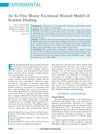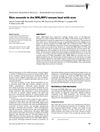 2 citations,
November 2022 in “Scientific reports”
2 citations,
November 2022 in “Scientific reports” Using gelatin sponges for deep skin wounds helps bone marrow cells repair tissue without scarring.
 February 2024 in “Bioengineering”
February 2024 in “Bioengineering” The hydrogel made of chitosan, HPMC, and insulin speeds up wound healing and could be a new dressing, especially for diabetics.
 2 citations,
July 2021 in “Biochemical and Biophysical Research Communications”
2 citations,
July 2021 in “Biochemical and Biophysical Research Communications” CTHRC1 helps hair grow back, and plantar dermis mixture boosts it.
1 citations,
March 2024 in “Nanomaterials” Biomimetic scaffolds are better than traditional methods for growing cells and could help regenerate various tissues.
8 citations,
February 2021 in “Journal of Clinical Medicine” Hair follicle stem cells are promising for blood vessel formation and tissue repair.
 132 citations,
January 2017 in “International Journal of Molecular Sciences”
132 citations,
January 2017 in “International Journal of Molecular Sciences” Fat-derived stem cells show promise for skin repair and reducing aging signs but need more research for consistent results.
 25 citations,
April 2021 in “The EMBO Journal”
25 citations,
April 2021 in “The EMBO Journal” Hair follicle stem cells help maintain skin health and could improve skin replacement therapies.
 147 citations,
November 2020 in “International Journal of Molecular Sciences”
147 citations,
November 2020 in “International Journal of Molecular Sciences” Keratinocytes help heal skin wounds by interacting with immune cells and producing substances that kill pathogens.
 13 citations,
October 2019 in “Journal of lasers in medical sciences”
13 citations,
October 2019 in “Journal of lasers in medical sciences” CO2 laser treatment for aging skin significantly changes immune system-related genes.
 24 citations,
January 2019 in “Biomaterials Science”
24 citations,
January 2019 in “Biomaterials Science” The shape of fibrous scaffolds can improve how stem cells help heal skin.
81 citations,
February 2016 in “Veterinary pathology” Progeroid mouse models show signs of early aging similar to humans, helping us understand aging better.
 93 citations,
November 2018 in “Carbohydrate Polymers”
93 citations,
November 2018 in “Carbohydrate Polymers” New nanocomposites with copper show promise for healing burn wounds and regenerating skin.
 October 2024 in “Biology”
October 2024 in “Biology” Dermal papilla cells can help regrow hair and are promising for hair loss treatments.
 1 citations,
April 2023 in “Journal of Animal Science and Biotechnology”
1 citations,
April 2023 in “Journal of Animal Science and Biotechnology” Melatonin helps grow more secondary hair follicles in young goats, improving cashmere production.
 36 citations,
May 2016 in “Biomaterials”
36 citations,
May 2016 in “Biomaterials” Endo-HSE helps grow hair-like structures from human skin cells in the lab.
 32 citations,
April 2017 in “Scientific Reports”
32 citations,
April 2017 in “Scientific Reports” Platelet-rich plasma can help grow more mouse hair follicles, but it doesn't work for human hair follicles yet.
 25 citations,
February 2019 in “Genomics”
25 citations,
February 2019 in “Genomics” Cashmere and milk goats have different hair growth cycles and gene expressions, which could help improve wool production.
 1 citations,
March 2024 in “Signal transduction and targeted therapy”
1 citations,
March 2024 in “Signal transduction and targeted therapy” NF-κB signaling is crucial in many diseases and can be targeted for new treatments.
 46 citations,
March 2015 in “Regeneration”
46 citations,
March 2015 in “Regeneration” Mice can grow new hair follicles after skin wounds through a process not involving existing hair stem cells, but requiring more research to understand fully.
 83 citations,
January 2015 in “World Journal of Stem Cells”
83 citations,
January 2015 in “World Journal of Stem Cells” Hair follicle regeneration needs special conditions and young cells.
 5 citations,
August 2013 in “InTech eBooks”
5 citations,
August 2013 in “InTech eBooks” KLF4 is important for maintaining stem cells and has potential in cancer treatment and wound healing.
 1 citations,
January 2013 in “Springer eBooks”
1 citations,
January 2013 in “Springer eBooks” Cosmeceuticals may benefit skin health but need more research for efficacy and safety confirmation.
March 2024 in “Biomedicines” Mesenchymal stem cells show promise for effective skin repair and regeneration.
 341 citations,
November 2009 in “The FASEB Journal”
341 citations,
November 2009 in “The FASEB Journal” Calreticulin has roles in healing, immune response, and disease beyond its known functions in the endoplasmic reticulum.
 252 citations,
April 2009 in “Seminars in Cell & Developmental Biology”
252 citations,
April 2009 in “Seminars in Cell & Developmental Biology” The immune system plays a key role in tissue repair, affecting both healing quality and regenerative ability.
 April 2024 in “Military Medical Research/Military medical research”
April 2024 in “Military Medical Research/Military medical research” Cellular and immunotherapies show promise for healing chronic wounds but need more research.
 13 citations,
December 2018 in “Development, Growth & Differentiation”
13 citations,
December 2018 in “Development, Growth & Differentiation” Sex hormones, especially estradiol, can change chicken feather shapes and colors.
 58 citations,
June 2006 in “Plastic and Reconstructive Surgery”
58 citations,
June 2006 in “Plastic and Reconstructive Surgery” Mice healed without scars as fetuses but developed scars as adults, suggesting scarless healing might be replicated with further research.
 51 citations,
January 2006 in “Wound Repair and Regeneration”
51 citations,
January 2006 in “Wound Repair and Regeneration” MRL/MpJ mice's skin wounds heal with scars, unlike their ear wounds which can regenerate.
 25 citations,
May 2020 in “EMBO reports”
25 citations,
May 2020 in “EMBO reports” Calcium is important for stem cell function and maintenance, especially in blood and skin cells.


























